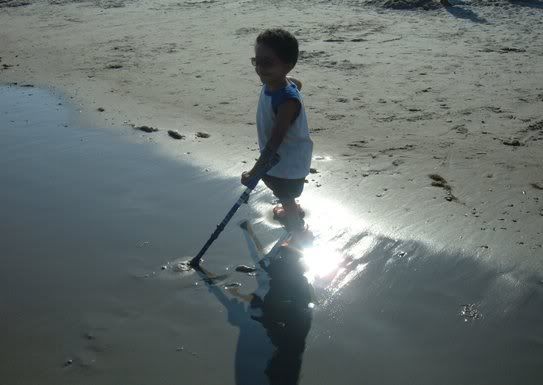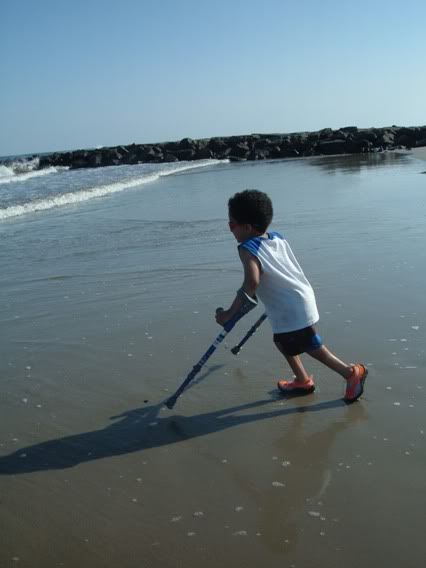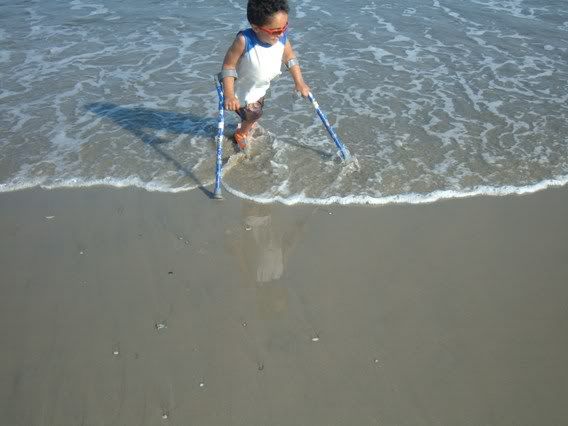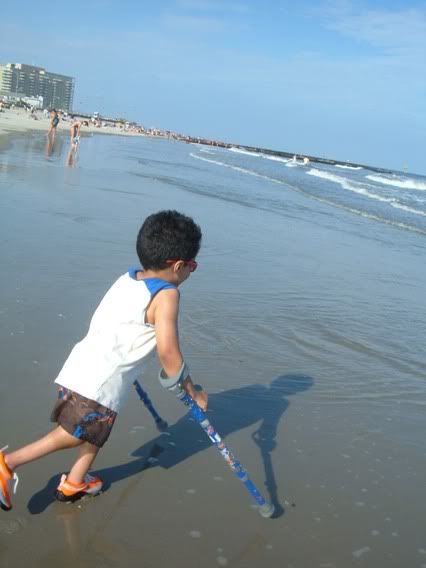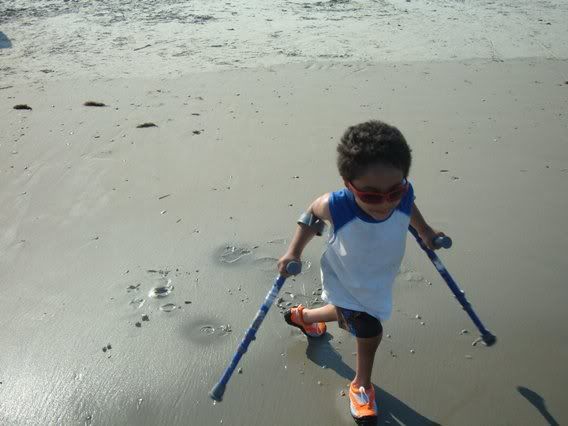"And there's knowing and learning/And the one a light a burning/In the cool dark night of the soul."—"Broken," Michael McDermott
The subject of this Disability Blog Carnival is “long nights and what we need to get through them.” Some of the longest, hardest nights of my life were when Jordan was just born. He insisted on being awake every morning from 2 to 6 AM, which really are the worst hours to be awake, if you think about it. I held him in his room in the rocking chair, looking out the window into the dark, feeling like we were the only two people in the world who were awake. Many of those nights I spent with him on my lap as I researched the condition he’d been diagnosed with—caudal regression syndrome (CRS). I found a MSN message board site that had all kinds of scary images of kids with CRS, and these kids had had their legs amputated. The photos seeemed especially scary because they were in black and white, and the kids’ eyes had black bars covering them, really depersonalizing them. I did notice some smiles on those faces and some very strong arms they were balanced on, but it was their lack of legs, of course, that I focused on. It was just horrifying to me, the thought of a doctor cutting off my baby’s legs.
In some people with CRS, their legs are paralyzed and have circulatory issues, and the person cannot straighten them. The legs are in a fixed “Indian style” position, which can’t even be straightened surgically. So the older treatment is to amputate the legs. This isn’t done as often today, although it is sometimes still done. Jordan’s doctor said, “I won’t do that” when I repeatedly asked him if that was what he recommended.
I do personally think the choice for amputation should be up to the person when he or she grows up. But I have met some people online who are now adults who had their legs amputated as kids, and they say that it was the best thing for them. Not focusing on the ethics of this—that is for another much longer discussion—but there I was, a new mother with a new baby, staring at these black and white images in the middle of the night of these kids with the same condition my baby has, and their legs had been amputated. How I got through those “long nights” I don’t really know, other than just the drive to do everything I could for my baby.
While looking at these photos on the computer and later sitting by his bedside for nine surgeries in his first five years, I’ve also pondered if this is “my fault.” The only “known” cause of CRS is maternal diabetes. They say 16% of kids with CRS have mothers with diabetes. That does leave 84% with no known cause. I do not have diabetes and was tested during pregnancy, too. But there is always the lingering doubt—did I cause this? It has been hard to think about women who take drugs, smoke, do whatever, and their babies are “perfect.” And I tried so hard, thought I did everything right, never took an illegal drug in my life, and my baby has this condition. And every time he has a procedure, these feelings come back to me—did I cause this? When he goes in for surgery, I think well, the doctor has to fix what I didn’t know how to do. I see friends and relatives having babies apparently without a thought that anything could possibly go awry. I’ve thought, “I didn’t grow him right” so many times these past six years. I know he is an incredible boy, and just thinking of all he has accomplished brings tears to my eyes. There are so many good things about it—“the people we wouldn’t have met,” the not taking things for granted, the cherishing the small milestones, life in wonderful Holland, right?—but this is a harder life than he really had to have.
So the answer to what it took to get me through these long nights? Early on, it was just determination, not wanting to fail my new baby—again. I think the humility that came from being 9 months pregnant with a broken ankle, although I was quite miserable at the time,
 gave me a little extra understanding. Later, I think I was able to get through these “long nights” just because of him—the spark I saw in his eyes, even when he was a newborn in the NICU and even though they told me he wouldn't live to age 1. His first real laugh, which happened in the middle of an orthopedic appointment at Shriners. His smile no matter where we were or what we were doing. His determination in taking steps with a tiny little walker, just months after surgery, when it seemed like he could barely move his legs at all. At ages 2 and 3, how he became quite a swashbuckler with his all-absorbing interest in pirates, swordfighting, jumping around, launching himself off his walker, and scaring me half to death. His determination on the soccer field playing against kids twice his size. And now as a first grader, the way he is the leader out on the playground, telling the other kids what they’re going to play that day, as he leads them around using his neon green crutches. I think it’s just been because of him that I’ve been able to do all of this. These little glimmers of hope, of accomplishments, of just being “back to normal” in our lives—these are what sustain me.
gave me a little extra understanding. Later, I think I was able to get through these “long nights” just because of him—the spark I saw in his eyes, even when he was a newborn in the NICU and even though they told me he wouldn't live to age 1. His first real laugh, which happened in the middle of an orthopedic appointment at Shriners. His smile no matter where we were or what we were doing. His determination in taking steps with a tiny little walker, just months after surgery, when it seemed like he could barely move his legs at all. At ages 2 and 3, how he became quite a swashbuckler with his all-absorbing interest in pirates, swordfighting, jumping around, launching himself off his walker, and scaring me half to death. His determination on the soccer field playing against kids twice his size. And now as a first grader, the way he is the leader out on the playground, telling the other kids what they’re going to play that day, as he leads them around using his neon green crutches. I think it’s just been because of him that I’ve been able to do all of this. These little glimmers of hope, of accomplishments, of just being “back to normal” in our lives—these are what sustain me.




